Natural Resource Science Semester
September to December, HlG̱aagilda Skidegate
This program is designed for undergraduate students who have completed the first two years of a natural science degree. It combines classroom learning with field instruction, featuring local guest speakers and various hands-on activities. The curriculum primarily builds on foundational ecological theories and observational science, with social theories and concepts related to linked social-ecological systems introduced later in the term.
Course Accreditation
Our courses are accredited by the University of British Columbia. After successful completion of a semester, students will earn fifteen 300-level UBC credits that can be transferred back to their home universities. Each course provides an integrated, interdisciplinary perspective and has a carefully developed schedule to balance classroom instruction with a variety of field activities and guest talks.
Our Learning Environment
Our programs are based out of the beautiful Haida Heritage Centre at Ḵay Llnagaay, in HlG̱aagilda Skidegate BC. In addition to lectures and coursework, students will explore Haida Gwaii’s natural surroundings, connect with local experts and community educators, and become immersed in our dynamic island community.
Find out what makes the Haida Gwaii Semesters stand out from other university programs.
There are two costs associated with the program: Tuition (based on enrolment as a domestic or international student) and the Program Fee ($4,080).
Program Fee: $4,080
As this is an off-campus program, there are numerous program-related costs that tuition alone cannot cover. Costs related to the program are classroom space, guest speaker honoraria, transportation and field trips, field equipment and safety gear, etc. Please refer to the information package for more details on how and when to make this payment.
University of British Columbia Tuition
Tuition is paid to UBC directly and is based on enrolment as a domestic or international student. The fee includes the tuition costs for fifteen 300-level UBC credits. For more information, please visit the UBC Student Services website.
How to Apply
Please click the status below that best represents you to see more information:
Ready to Apply Now?
Frequently Asked Questions about HGI Semesters and Summer Sessions
Courses
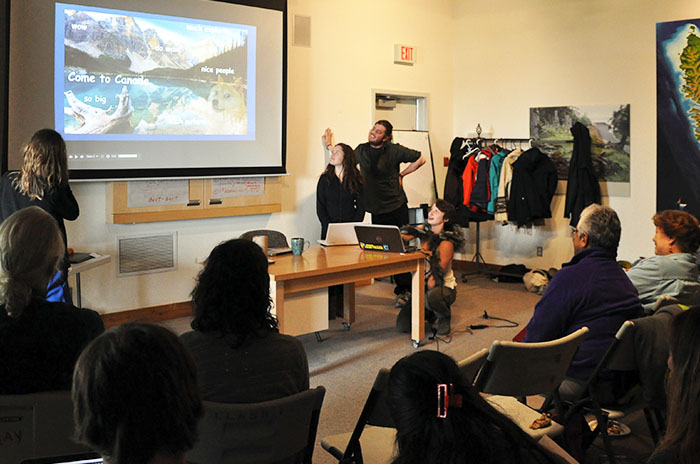
HGSE 352 – Indigenous Governance & Land Stewardship Seminar
This semester-long seminar provides an overview of First Nations governance related to resources and territory, focusing on Haida Gwaii. Through case studies and guest speakers, we examine local governance structures for land and marine planning, forestry, fisheries, cultural heritage, and protected areas.
To understand current management, we explore the colonial history that led to Crown control of lands and First Nations’ exclusion. We discuss strategies First Nations have used to regain access and control and their current collaborations in resource management.
Topics include Indigenous laws, stewardship, traditional knowledge, colonialism, resistance, Aboriginal rights, reconciliation, and co-management.
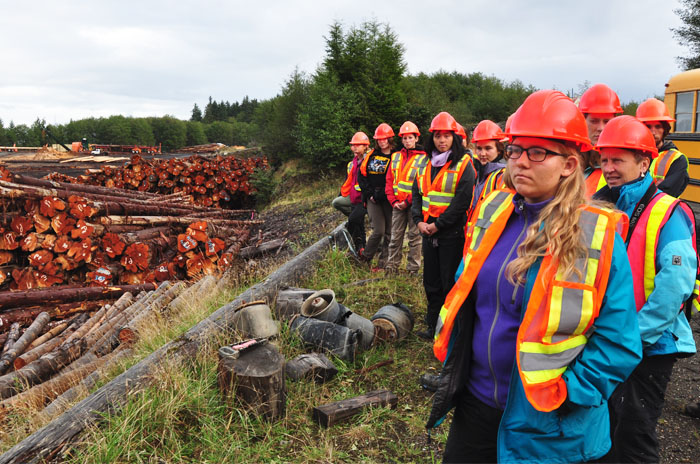
HGSE 355 – Applied Ecology of Coastal Terrestrial Ecosystems
This course offers an in-depth examination of the processes that shape coastal terrestrial ecosystems over time and how this knowledge applies to current ecological realities. It covers a range of topics, from the historical geology of the islands to the structure, function, and diversity of today’s forests and landscapes.
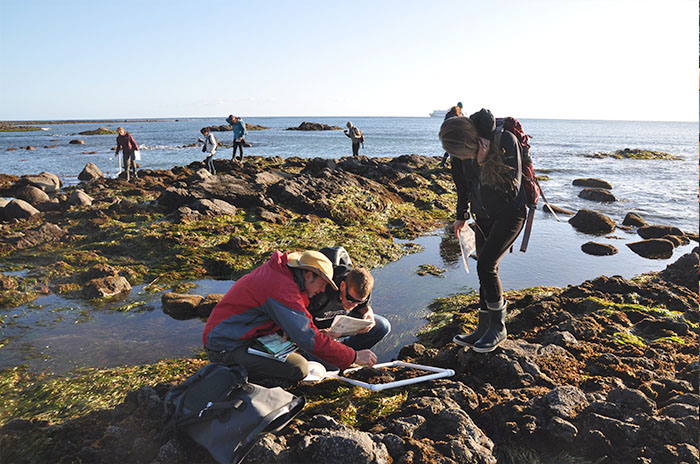
HGSE 356 – Marine-Terrestrial Interactions
Land and sea dynamics greatly influence each other in Haida Gwaii, and students in this course have a unique opportunity to explore these marine-terrestrial connections. They will learn about nutrient cycling between the marine environment and coastal forest ecosystems, how the physical characteristics of this interface affect these inputs, and which species play a crucial role in driving these interactions.
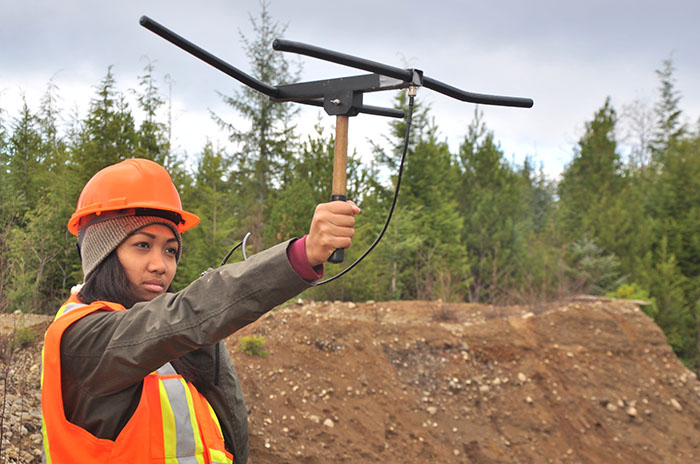
HGSE 357 – Ecology & Management of Island Wildlife
This course focuses on the unique biological attributes of island wildlife, including subspecies, isolated populations, and distinct evolutionary pathways. Topics include an overview of endemic species on Haida Gwaii and their evolutionary history within the framework of island biogeography theory. The course also examines the factors that influence population-level outcomes for both native and introduced species.
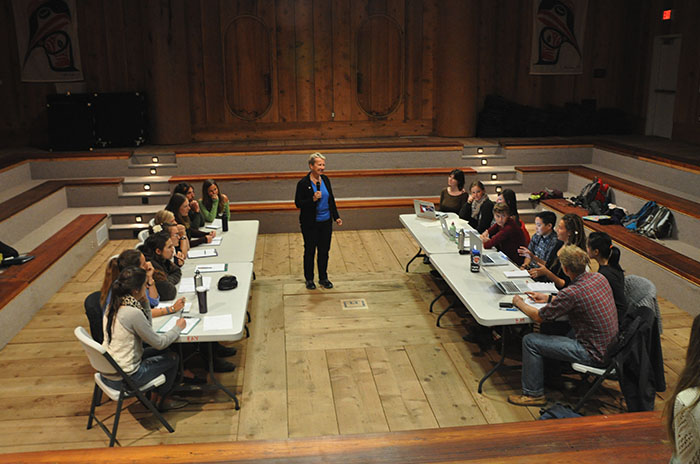
HGSE 359 – Ecosystem Based Management
Ecosystem-Based Management (EBM) is defined as an “adaptive approach to managing human activities that seeks to ensure the coexistence of healthy, fully functioning ecosystems and human communities” (Pacific North Coast Integrated Area Plan, 2017). Although the concept of EBM is well established in academic literature, there remains a significant gap between theory and practice. Haida Gwaii offers rich examples, both terrestrial and marine, for analyzing the benefits and challenges of applying EBM in real-world settings.
“This experience definitely changed my life. It was my first time witnessing a cut block first-hand, and
seeing how difficult sustainable forestry is – both economically and environmentally – was very eye-opening. This idea of sustainability transferred across all of our courses (as well as across scientific, political and economic boundaries), and was the first time I really felt I understood all that this word entails. I’d absolutely recommend this experience to any and all students!”
“My experience with the Haida Gwaii Semesters is one that I cherish and reflect upon frequently. What I learned from my time there has affected many aspects of my life now: education and career goals, my drive to make change, and relationships – to name a few. I view my experience as being somewhat two-fold. On one hand, we had the opportunity to learn from amazing and inspiring teachers (both course professors and guest speakers), greatly build upon our transferrable skills in research, writing, collaboration and presenting, and conduct a variety of field work, while simultaneously exploring one the most beautiful places on earth. On the other hand, this program opens the door (and pushes you through it) for personal growth. Without the program I may never have known what it feels like to find a family within my peers, to be truly welcomed into a community with such a complicated past & vibrant culture, to realize my place in this world while peering at the full moon through the crowns of western red cedars, or to be drenched head-to-toe while surrounded by decaying salmon carcasses (bring good rain pants). I wouldn’t be the same person I am today without the time I spent on the edge of this world.”
“Doing the [Natural Resource Science] semester is one of the best things I have ever done. For me, [Haida Gwaii] was the perfect place to live and learn. Combining life and learning was quite seamless and happened organically […] I still aim to return to the islands as soon as I can.”
“Natural Resource Science with Haida Gwaii Semesters was an excellent experience for me […] Each student is treated as a valuable member of the school and there is an overwhelming sense of inclusiveness when on Haida Gwaii. The connections HGHES has to resources on Haida Gwaii are unparalleled and provide a unique field school setting. The school branches out to so many different people on Haida Gwaii to come speak to the class. As a class we were also brought to numerous locations around Haida Gwaii that provided excellent settings to learn about natural resource science such as estuaries, alpine meadows, forests, beaches, and bogs […] We were able to carry out activities such as analyzing acoustic recordings, setting up pit traps, using telemetry, and assessing habitat. It is neat to be able to do all of these things with the variety of people HGHES collaborates with.”
Looking for more information?
For more information about this program, please contact hg.institute@ubc.ca


